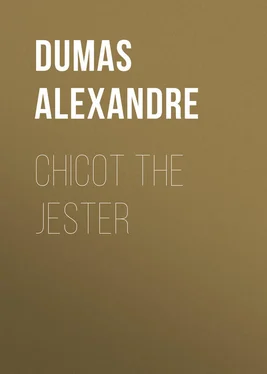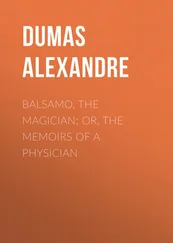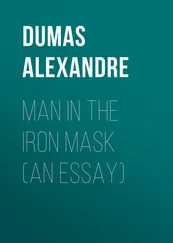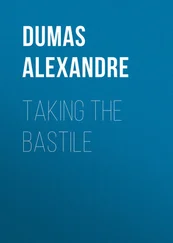Alexandre Dumas - Chicot the Jester
Здесь есть возможность читать онлайн «Alexandre Dumas - Chicot the Jester» — ознакомительный отрывок электронной книги совершенно бесплатно, а после прочтения отрывка купить полную версию. В некоторых случаях можно слушать аудио, скачать через торрент в формате fb2 и присутствует краткое содержание. Жанр: literature_19, foreign_antique, foreign_prose, на английском языке. Описание произведения, (предисловие) а так же отзывы посетителей доступны на портале библиотеки ЛибКат.
- Название:Chicot the Jester
- Автор:
- Жанр:
- Год:неизвестен
- ISBN:нет данных
- Рейтинг книги:5 / 5. Голосов: 1
-
Избранное:Добавить в избранное
- Отзывы:
-
Ваша оценка:
- 100
- 1
- 2
- 3
- 4
- 5
Chicot the Jester: краткое содержание, описание и аннотация
Предлагаем к чтению аннотацию, описание, краткое содержание или предисловие (зависит от того, что написал сам автор книги «Chicot the Jester»). Если вы не нашли необходимую информацию о книге — напишите в комментариях, мы постараемся отыскать её.
Chicot the Jester — читать онлайн ознакомительный отрывок
Ниже представлен текст книги, разбитый по страницам. Система сохранения места последней прочитанной страницы, позволяет с удобством читать онлайн бесплатно книгу «Chicot the Jester», без необходимости каждый раз заново искать на чём Вы остановились. Поставьте закладку, и сможете в любой момент перейти на страницу, на которой закончили чтение.
Интервал:
Закладка:
“One morning my father entered my room with an air graver than usual, but still evidently joyful. ‘My child,’ said he, ‘you always have said you did not wish to leave me.’
“‘Oh! my father,’ cried I, ‘it is my dearest wish.’
“‘Well, my Diana,’ continued he, embracing me, ‘it only depends now on yourself to have your wish realized.’ I guessed what he was about to say, and grew dreadfully pale.
“‘Diana, my child, what is the matter?’ cried he.
“‘M. de Monsoreau, is it not?’ stammered I. ‘Well?’ said he, astonished. ‘Oh! never, my father, if you have any pity for your daughter, never – ’
“‘Diana, my love,’ said he, ‘it is not pity I have for you, but idolatry; you know it; take a week to reflect, and if then – ’
“‘Oh! no, no,’ cried I, ‘it is useless; not a day, not a minute! No, no, no!’ and I burst into tears. My father adored me, and he took me in his arms, and gave me his word that he would speak to me no more of this marriage.
“Indeed, a month passed, during which I neither heard of nor saw M. de Monsoreau. One morning we received an invitation to a grand fête which M. de Monsoreau was to give to the Duc d’Anjou, who was about to visit the province whose name he bore. To this was added a personal invitation from the prince, who had seen my father at court. My first impulse was to beg my father to refuse, but he feared to offend the prince, so we went. M. de Monsoreau received us as though nothing had passed, and behaved to me exactly as he did to the other ladies.
“Not so the duke. As soon as he saw me, he fixed his eyes on me, and scarcely ever removed them. I felt ill at ease under these looks, and begged my father to go home early. Three days after M. de Monsoreau came to Méridor; I saw him from the windows, and shut myself up in my own room. When he was gone, my father said nothing to me, but I thought he looked gloomy.
“Four days passed thus, when, as I was returning from a walk, the servants told me that M. de Monsoreau was with my father, who had asked for me several times, and had desired to be immediately informed of my return. Indeed, no sooner had I entered my room, than my father came to me.
“‘My child,’ said he, ‘a motive which I cannot explain to you, forces me to separate myself from you for some days. Do not question me, but be sure that it is an urgent one, since it determines me to be a week, a fortnight, perhaps a month, without seeing you.’ I trembled, I knew not why, but I fancied that the visits of M. de Monsoreau boded me no good.
“‘Where am I to go, my father?’ asked I.
“‘To the château of Lude, to my sister, where you will be hidden from all eyes. You will go by night.’ ‘And do you not accompany me?’ ‘No, I must stay here, to ward off suspicion; even the servants must not know where you are going.’ ‘But then, who will take me there?’ ‘Two men whom I can trust.’ ‘Oh! mon Dieu! father,’ I cried. The baron embraced me. ‘It is necessary, my child,’ said he.
“I knew my father’s love for me so well that I said no more, only I asked that Gertrude, my nurse, should accompany me. My father quitted me, telling me to get ready.
“At eight o’clock (it was dark and cold, for it was the middle of winter) my father came for me. We descended quietly, crossed the garden, when he opened himself a little door leading to the forest, and there we found a litter waiting, and two men; my father spoke to them, then I got in, and Gertrude with me.
“My father embraced me once more, and we set off. I was ignorant what danger menaced me, and forced me to quit the castle of Méridor. I did not dare to question my conductors, whom I did not know. We went along quietly, and the motion of the litter at last sent me to sleep, when I was awoke by Gertrude, who, seizing my arm, cried out, ‘Oh, mademoiselle, was is the matter?’
“I passed my head through the curtains. We were surrounded by six masked cavaliers, and our men, who had tried to defend me, were disarmed. He who appeared the chief of the masked men approached me, and said; ‘Reassure yourself, mademoiselle, no harm will be done to you, but you must follow us.’
“‘Where?’ I asked. ‘To a place,’ he replied, ‘where, far from having anything to complain of, you will be treated like a queen.’ ‘Oh! my father! my father!’ I cried. ‘Listen, mademoiselle,’ said Gertrude, ‘I know the environs, and I am strong; we may be able to escape.’
“‘You must do as you will with us, gentlemen,’ said I, ‘we are but two poor women, and cannot defend ourselves.’ One of the men then took the place of our conductor, and changed the direction of our litter.”
Here Diana stopped a moment, as if overcome with emotion.
“Oh, continue, madame, continue,” cried Bussy.
It was impossible for Diana not to see the interest she inspired in the young man; it was shown in his voice, his gestures, his looks. She smiled, and went on.
“We continued our journey for about three hours, then the litter stopped. I heard a door open, we went on, and I fancied we were crossing a drawbridge. I was not wrong, for, on looking out of the litter, I saw that we were in the courtyard of a castle. What castle was it? We did not know. Often, during the route, we had tried to discover where we were, but seemed to be in an endless forest. The door of our litter was opened, and the same man who had spoken to us before asked us to alight. I obeyed in silence. Two men from the castle had come to meet us with torches; they conducted us into a bedroom richly decorated, where a collation waited for us on a table sumptuously laid out.
“‘You are at home here, madame,’ said the same man, ‘and the room for your servant is adjoining. When you wish for anything, you have but to strike with the knocker on this door, and some one, who will be constantly in the antechamber, will wait on you.’ This apparent attention showed that we were guarded. Then the man bowed and went out, and we heard him lock the door behind him.
“Gertrude and I were alone. She was about to speak, but I signed her to be silent, for perhaps some one was listening. The door of the room which had been shown us as Gertrude’s was open, and we went in to examine it. It was evidently the dressing-room to mine, and was also locked. We were prisoners. Gertrude approached me, and said in a low tone: ‘Did demoiselle remark that we only mounted five steps after leaving the court?’ ‘Yes,’ said I. ‘Therefore we are on the ground floor.’ ‘Doubtless.’ ‘So that – ’ said she, pointing to the window. ‘Yes, if they are not barred.’ ‘And if mademoiselle had courage.’ ‘Oh! yes, I have.’
“Gertrude then took a light, and approached the window. It opened easily, and was not barred; but we soon discovered the cause of this seeming negligence on the part of our captors. A lake lay below us, and we were guarded by ten feet of water better than by bolts and bars. But in looking out I discovered where we were. We were in the château of Beaugé, where they had brought me on the death of my poor Daphné. This castle belonged to the Duc d’Anjou, and a sudden light was thrown upon our capture. We shut the window again, and I threw myself, dressed, on my bed, while Gertrude slept in a chair by my side. Twenty times during the night I woke, a prey to sudden terror; but nothing justified it, excepting the place where I found myself, for all seemed asleep in the castle, and no noise but the cry of the birds interrupted the silence of the night. Day appeared, but only to confirm my conviction that flight was impossible without external aid; and how could that reach us? About nine they came to take away the supper and bring breakfast. Gertrude questioned the servants, but they did not reply. Our morning passed in fruitless plans for escape, and yet we could see a boat fastened to the shore, with its oars in it. Could we only have reached that, we might have been safe.
Читать дальшеИнтервал:
Закладка:
Похожие книги на «Chicot the Jester»
Представляем Вашему вниманию похожие книги на «Chicot the Jester» списком для выбора. Мы отобрали схожую по названию и смыслу литературу в надежде предоставить читателям больше вариантов отыскать новые, интересные, ещё непрочитанные произведения.
Обсуждение, отзывы о книге «Chicot the Jester» и просто собственные мнения читателей. Оставьте ваши комментарии, напишите, что Вы думаете о произведении, его смысле или главных героях. Укажите что конкретно понравилось, а что нет, и почему Вы так считаете.












